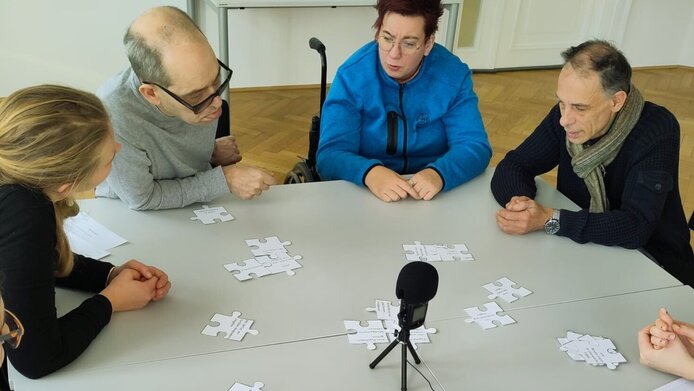Participation as a methodological challenge
In methodological terms, this presented something of a challenge. “In order to be understood by everyone, we had to get creative together with our consultants – and start by developing appropriate material,” notes Zeilinger. She opted for universal design, texts in simple language, and easy-to-understand images.
In order to sift out the issues that are considered particularly important for the mental health of the target group – including housing, work, adequate support, or mobility – the team designed large, illustrated puzzle pieces that could be physically moved around and rearranged during the discussion rounds. For the evaluation they employed a simple rating scale with green check marks, red crosses, and a star scale. Since there is great international interest in participatory approaches, the team’s methodological work will be presented in detail in a separate publication.
Consensus building with Delphi studies
Delphi studies are an effective tool for reaching a common understanding and consensus among experts on a topic for which there is only a limited amount of existing research. The process involves several stages. In a first step, the individual knowledge of the experts is collected, with all perspectives being given equal weight. The collected issues are then weighted by the participants in several rounds.
In Zeilinger's project, 37 mental health experts – mental health professionals and professional caregivers – as well as 23 “experts in their own right,” i.e., people with ID, participated in the first round. “As far as I know, this was the first Delphi study in which the same questionnaire was used for both experts with and those without ID,” Zeilinger is pleased to report.
What is important to those affected
The Delphi study revealed gradual differences in the assessments of the expert groups: professionals without ID tended to focus more on deficits and the various support needs. People with ID, on the other hand, who display “a very nuanced perception,” consider developing their own skills and competencies in a supportive environment to be particularly important for their mental health. This includes basic skills such as reading, writing and doing sums, social skills (“responding well in social situations”), and mobility (“being able to take a bus ride alone “).
“People with ID definitely want support – but without being patronized,” Zeilinger points out. Other important desiderata are a good living environment where it is possible to “occasionally be alone” and physical health: “If my body isn't well, I'm not well either.”
According to Zeilinger, the WHO definition is applicable in many respects. However, experts with ID hardly mentioned points such as “working well” or “contributing to the community.” This is probably due to their social environment: since many people with ID work in sheltered workshops without pay, they are not even aware of the possibility.
A contribution to health equity
At this point, the findings are the conceptual groundwork for a definition that Zeilinger hopes will be internationally valid and contribute to greater health equity. “Health equity means adapting health promotion and care to the needs of people with ID.” Incidentally, this would also be in line with the UN Convention on the Rights of Persons with Disabilities, which calls for equal health standards for all, and which Austria is currently implementing only to a very insufficient level.







